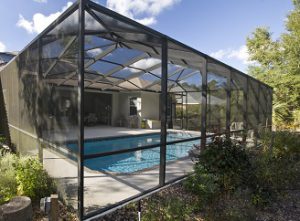How do I prepare my Florida pool for an oncoming hurricane?
In the frenzy of preparing for an impending hurricane, many of those with residential pools overlook steps needed to prepare the pool for a major storm. Following are some tips for what to do and NOT to do when it comes to pool preparation before and after a hurricane.
Before the Storm- what NOT to do
- Do not drain or partially drain your pool before a storm

Duck floats in a swimming pool, UF/IFAS photo - Outdoor furniture and accessories should NEVER be placed in the pool
- Never trim your landscape plant into the pool
- Do not pressure-wash into your pool
It is not a good idea to empty your residential pool – neither partially nor completely – when expecting a big rain event. In some instances storms turn away or major rain does not arrive as predicted. If you have drained your pool down below the skimmer and no rain comes, this could burn up your pump motor costing you hundreds of dollars in pump repairs or replacement. This could possibly even cause a fire. The cost of refilling the pool with hundreds of gallons (or more) of municipal water after a close call could similarly add hundreds of dollars to your monthly water bill.

Pools Are Made To Hold Water
But if the storm does hit, the pool is made to hold water and can handle being filled to overflowing. In a storm, when many inches of rain are expected, the ground surrounding a pool will become saturated. All that extra water on the outside of even a partially drained pool could cause the pool to crack under the weight of water. Draining the pool could cause leaks or major plumbing damage. It could also inflict severe damage to the pool’s electrical wiring. Another possibility, damage to the pool decking structure could be catastrophic.
It is best to keep the pool full until after the storm has passed and the surrounding landscape has had time to drain. Any excess rainwater in the pool will drain away over the pool deck and, hopefully, away from structures.
When to Shock
However, you may shock your pool before the storm arrives. This will help stave off some of the algae and bacteria if your area does flood. The pool will probably need another shock treatment after the area is deemed safe, all debris is removed, and the power comes back on.
The University of Florida/Institute of Food and Agricultural Sciences Electronic Data Information Source (UF/IFAS EDIS) publication entitled, “Closing Your Seasonal Home” has a paragraph on pool care while you are away from home. These tips will work if you are also evacuating for a storm.
Keep Foreign Objects Out
Never place patio furniture and outdoor accessories into the pool to keep them from blowing away. The water and chemicals will cause corrosion of the furniture and chemical reactions will leave permanent staining in the pool’s finish. Any dirt or debris wedged into the legs of the outdoor furniture could also leave the pool finish stained. Most of these stains require expensive resurfacing the pool to remove them.
During the Storm
Keep an eye on the pool’s bottom drain and skimmer basket. As long as the power is still on, keep the pump running for as long as possible to keep the water circulating through the filter. This will help remove the small particles which blow into the pool. When leaves, twigs, or other debris cover the bottom drain or fill the skimmer, empty them quickly to keep the circulation going. If the water level reaches the top of the pool and the power is still on this is a good thing. Assuming your pool decking has been engineered properly, the water overflow will follow the law of gravity and flow away from your home.
After the Storm
Do not begin any pool clean up until you have assessed the area to be safe- no downed power lines, no snakes or alligators in the pool. Only then should you remove any debris from the pool. You want to remove this before decomposition of the debris has a chance to cause staining to the pool finish. If you have a pool cleaning service, do not count on them getting to your pool immediately. These service people usually have a weekly route and day scheduled for your service and many other pool-owners that will be in the same position as you. Be patient. They may also charge a “clean-up” fee which should be less costly if you have removed major storm debris from the pool yourself.

WARNING! Unexpected Wildlife
Beware of unexpected wildlife when doing your after-storm clean-up. Alligators, turtles, crabs, birds, rabbits, frogs, snakes, and bears can all get confused by all the extra water and downed trees and will show up in the strangest places!
Once the area around the pool is relatively dry of standing water it is time to bring your water level back down to mid-way up the tile line or half- way up the skimmer. This will drain additional water into your landscape. Be mindful where you aim the drain hose.
WARNING! DO NOT turn your back on a draining pool. It is very easy to get busy with other tasks and forget to watch the water level. Refilling the water again could be costly in your water bill and in treatment chemicals.
You may desire to have your house and pool deck pressure washed after storm clean-up. As much as is possible, keep that dirty-pressure-wash spray away from your pool. A qualified pressure wash serviceman can aim the spray away from the pool. Not only will those added chemicals and dirt throw off the chemical balance of your pool but also the tiny debris particles could cause damage to pool equipment and lead to unnecessary extra cleanings. Most pool service vacuums will not catch these tiny particles so they will remain in the pool for some time and can cause unhealthy algae blooms. There are no chemical treatments to remove fertilizers from water.
Particles stirred up by pressure washing:
- dirt and grass clippings
- fertilizers and pesticide residues
- paint chips, sand, roofing nails, and concrete pieces
- algae, mold, and fungus
- pet and wildlife feces
- sewer and septic tank overflow from the high water table
You do NOT want to swim in that chemical bath. I will repeat: try to keep the overspray of pressure washing away from your pool to eliminate any extra debris entering the water.
Once all the clean up is finished check your chemical levels again. Does it need another shock treatment? These treatments should kill most bacteria, algae, and viruses but they will NEVER remove harmful fertilizers and chemicals from your pool water.
After an appropriate time for the shock treatment to do it’s job (your pool service tech can tell you how long to wait) you will then be able to enjoy an evening dip before bedtime. This will be especially enjoyable after a long, hot day of storm clean up.

The UF/IFAS EDIS (University of Florida/Institute of Food and Agricultural Sciences Electronic Data Information Source) publication “Closing your Seasonal Home” has a section on preparing your pool for your absence.
The UF/IFAS EDIS publication entitled: “Reclaimed Water Use in the Landscape: Frequently Asked Questions about Reclaimed Water” has advised not to use reclaimed water to fill your pool nor for children’s water toys nor for watering vegetable plants.
UF/IFAS EDIS also has two publications on dealing with wildlife in your landscape:
- “Dealing with Snakes in Florida’s Residential Areas- Identifying Commonly Encountered Snakes”
- “Dealing with Unwanted Wildlife in an Urban Environment“
If you wish to read more UF/IFAS EDIS disaster preparedness documents, please visit the Disasters topic page.
 2
2
